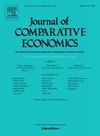家族企业的文化起源
IF 3.1
2区 经济学
Q1 ECONOMICS
引用次数: 0
摘要
是什么决定了家族企业的盛行?在这个项目中,我们研究了历史家族文化在家族企业空间分布中的作用。利用来自中国的详细企业层面数据,我们发现,在家族史文化较强的地区,家族企业的比例更大。通过工具变量法和匹配法进一步证实了结果。通过对机制的考察,我们发现家族文化历史较强地区的企业家:(1)家族成员参与企业活动的程度较高;(ii)更有可能从家庭成员那里筹集初始资金;(iii)更愿意将公司传给子女。历史上的家族文化预示着更好的公司业绩,部分原因是杠杆率较低。本文章由计算机程序翻译,如有差异,请以英文原文为准。
The cultural origins of family firms
What determines the prevalence of family firms? In this project, we investigate the role of historical family culture in the spatial distribution of family firms. Using detailed firm-level data from China, we find that there is a larger share of family firms in regions with a stronger historical family culture, as measured by genealogy density. The results are further confirmed by an instrumental variables approach and a matching approach. Examining mechanisms, we find that entrepreneurs in regions with a stronger historical family culture: (i) tend to have family members engage more in firms; (ii) are more likely to raise initial capital from family members; (iii) are more willing to pass on the firms to their children. Historical family culture predicts better firm performance partly due to a lower leverage ratio.
求助全文
通过发布文献求助,成功后即可免费获取论文全文。
去求助
来源期刊

Journal of Comparative Economics
ECONOMICS-
CiteScore
4.40
自引率
0.00%
发文量
66
审稿时长
45 days
期刊介绍:
The mission of the Journal of Comparative Economics is to lead the new orientations of research in comparative economics. Before 1989, the core of comparative economics was the comparison of economic systems with in particular the economic analysis of socialism in its different forms. In the last fifteen years, the main focus of interest of comparative economists has been the transition from socialism to capitalism.
 求助内容:
求助内容: 应助结果提醒方式:
应助结果提醒方式:


